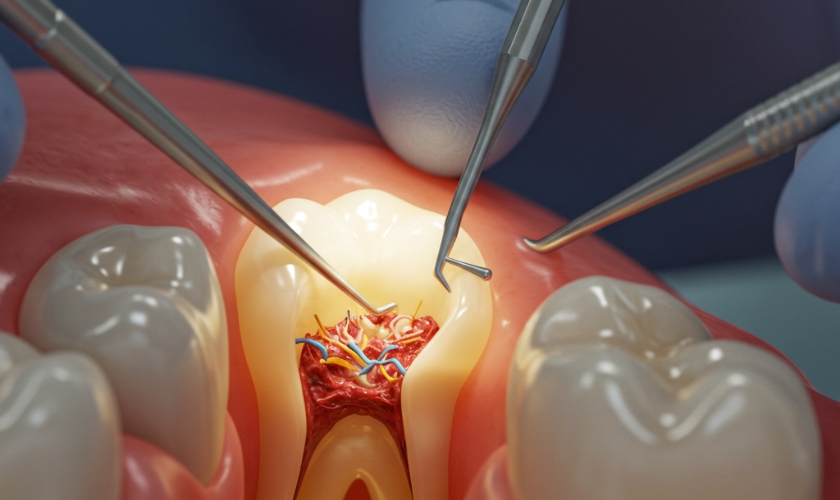345B Latoria Blvd #202, Victoria, BC, V9C 0S9

When tooth pain strikes unexpectedly, it’s more than just an inconvenience—it could be your body’s way of telling you something serious is going on beneath the surface. Root canals often get a bad rap, but the truth is, they’re robust procedures that save teeth and relieve pain. In some cases, waiting isn’t an option. You may need an emergency root canal, and recognizing the signs early can make all the difference.
What’s an Emergency Root Canal?
An emergency root canal is performed when a tooth’s pulp—its innermost tissue—becomes infected or inflamed due to deep decay, trauma, or untreated cavities. The procedure involves removing the damaged pulp, disinfecting the area, and sealing the tooth to prevent further issues.
But how do you know when it’s time to act fast? Let’s break it down.
1. Persistent, Throbbing Toothache
Not all toothaches are created equal. If you feel continuous, intense, or radiating pain that doesn’t subside with over-the-counter meds or worsens when lying down, it could mean the tooth’s pulp is infected. Emergency root canals relieve this pressure and prevent the infection from spreading.
2. Swelling and Tenderness in the Gums
Swollen gums near a particular tooth—especially if they’re red, puffy, or tender to the touch—may indicate an infection that’s spread to the surrounding tissue. You may also notice a small bump or pimple-like abscess, which is your body’s attempt to drain the infection.
3. Prolonged Sensitivity To Hot & Cold
While it’s common to feel a slight zing from ice cream or coffee, lingering sensitivity that lasts more than 30 seconds, especially to hot liquids, might suggest nerve damage inside the tooth. That’s a surefire sign that deeper intervention may be needed, and reaching out to an emergency dentist in Victoria can help you avoid more severe pain or complications.
4. Discoloration of The Tooth
A healthy tooth should maintain its color. If one tooth turns gray, brown, or dark yellow, it may indicate that the pulp is dying. This often happens after trauma or untreated decay and is a signal that an emergency root canal might be necessary to save it.
Here’s Why Timely Action Matters
According to the American Association of Endodontists, over 15 million root canals are performed annually in the U.S., and delaying treatment can lead to tooth loss or severe infection.
Prompt intervention can not only save your tooth but also protect your overall health.
5. Bad Taste or Odor In The Mouth
If you’re noticing a persistent bad taste or foul odor—even after brushing and rinsing—it could be due to an abscess that’s leaking pus. This is a red flag for infection, and it requires urgent care to prevent it from spreading to your jaw or bloodstream. Ignoring it doesn’t just affect the problem, but also compromises your oral health.
6. Pain When Chewing or Touching The Tooth
Pain while biting or touching a specific tooth may mean the surrounding nerves and ligaments are inflamed. While it could also indicate a crack or cavity, if the discomfort is sharp or worsening, an emergency root canal may be the fastest way to get relief.
7. Fever & Facial Swelling
In extreme cases, the infection inside the tooth can trigger a systemic response, leading to fever, swollen lymph nodes, and even swelling in the face or neck. This is a dental emergency—seek treatment immediately, as it could indicate the infection has spread.
What Happens During a Root Canal Emergency?
Once a dentist confirms the need, the process typically includes:
- Local anesthesia for comfort.
- Removal of the infected pulp.
- Cleaning and disinfecting the root canal.
- Filling and sealing the tooth.
- A crown may be placed later to restore full function.
You’ll likely feel better immediately after the procedure, and within a few days, you’ll return to your normal activities.
Don’t Wait It Out!
It’s tempting to brush off tooth pain and hope it goes away. But when it comes to a possible infection, waiting could mean worsening damage—or even losing the tooth altogether. Emergency root canals are safe, effective, and best of all, they provide relief from pain you shouldn’t have to live with.
If you’re noticing any of these symptoms, don’t wait. Book a consultation with our dentist in Victoria right away—your smile and your health depend on it.

